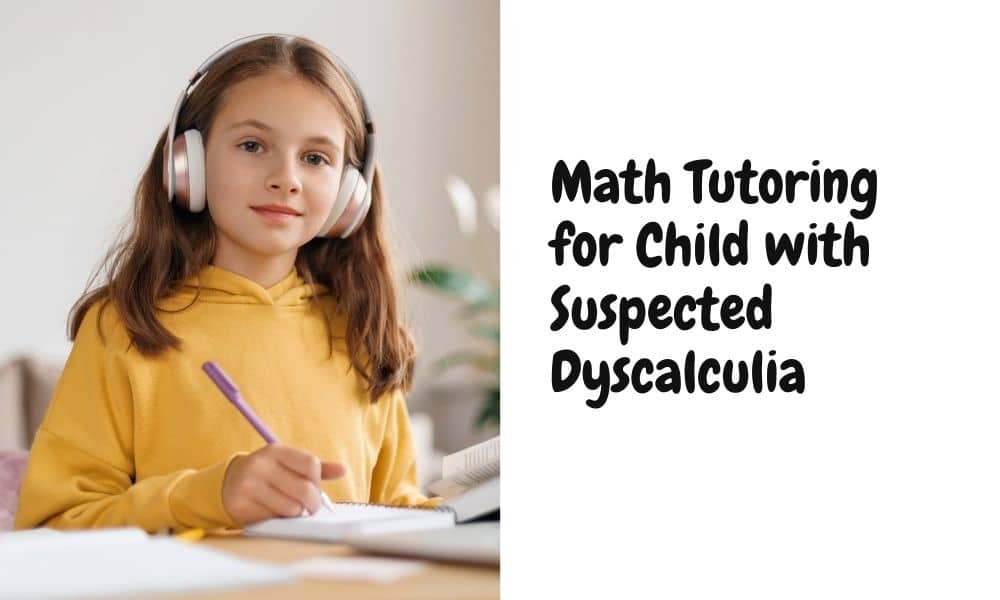
Hi!
My 10-year-old has a severe struggle with math. I think she might have dyscalculia, but I don’t want to self-diagnose. She relies on her fingers to do single-digit addition and subtraction. She currently has a math tutor, but I think she needs someone who specializes in dyscalculia. I am inquiring about your approach, tutoring structure, and pricing.
Alicia
Hello Alicia
Thank you for your inquiry.
Dyscalculia is a severe struggle with math in the absence of an intellectual disability (IQ below 75) and hearing, vision, neurological, and motor disorders. Struggling students do not need a dyscalculia diagnosis before they receive the correct type of intervention that will help them thrive in math.
Math tutoring will only help if it addresses the cause of the problem, which is reduced neuroplasticity coupled with weak cognitive skills. Reduced neuroplasticity means that the brain areas involved in numeracy are slow to change (learn). Cognitive skills are mental skills used in acquiring knowledge, manipulating information, reasoning, and problem-solving. Cognitive skills essential for math include visual processing and sequential, visual-spatial, long-term, and working memory, as well as logical reasoning.
Because of the abovementioned issues, students with math learning disabilities develop a poor number sense. They may struggle to learn to count and skip count (which is the basis of knowing the times tables) and do basic addition, subtraction, multiplication, and division. They will use their fingers to add or subtract single digits. They often struggle with place value. When asked to write a number like 92,007, they might write 920,7. They might write 515 as 50015. All students with math learning disabilities lack procedural knowledge, i.e., knowing and remembering what steps to follow to solve mathematical problems.
Edublox aims to increase neuroplasticity and improve weak cognitive skills, combined with math tutoring focusing on number sense and procedural knowledge. Depending on the child’s age, our procedural teaching covers the four basic operations, followed by everything related to fractions and mixed numbers, decimals, percentages, order of operations, and integers.
We finished tutoring a 13-year-old student only this morning (Oct 22, 2024) who previously struggled with basic math. He could not count properly in ones, could add with carrying, but could not subtract with borrowing. He struggled to write numbers in the ten thousands and wrote 89,022 as 8922. We started on May 4, 2024, doing three half-hour lessons per week and, later, two half-hour lessons per week. The price is between $24-$35 per lesson, depending on the package you purchase. Development Tutor, our home-based cognitive training program, costs $36 monthly.
This student can now count and knows the times tables up to 12 and even 15. He is now good with mental math and proficient in the four basic operations, fractions, decimals, percentages, order of operations, and integers. He went from being unable to follow a regular math curriculum to doing a regular 6th-grade math curriculum after scoring 80% on a 5th-grade admission test. Naturally, some students take longer to make these gains, but all students can be helped.
Click here to book a free consultation.
Regards
Sue
More about Sue
Sue is an educational specialist in dyscalculia and dyslexia and has a B.A. Honors in Psychology and B.D. degree. Early in her professional career, Sue was instrumental in training over 3,000 teachers and tutors, providing them with the foundational and practical understanding to facilitate cognitive development among children who struggle to read and write. With over 30 years of research to her name, Sue conceptualized the Edublox teaching and learning methods that have helped thousands of children who were struggling to read, learn and achieve. In 2007, she opened the first Edublox reading and learning clinic, and now there are 30 Edublox clinics internationally. Her proudest moments are when she sees a child who had severe learning difficulties come top of their class after one or two years at Edublox. Sue always takes time to collect the ‘hero’ stories of students whose self-esteem is lifted as their marks improve.
